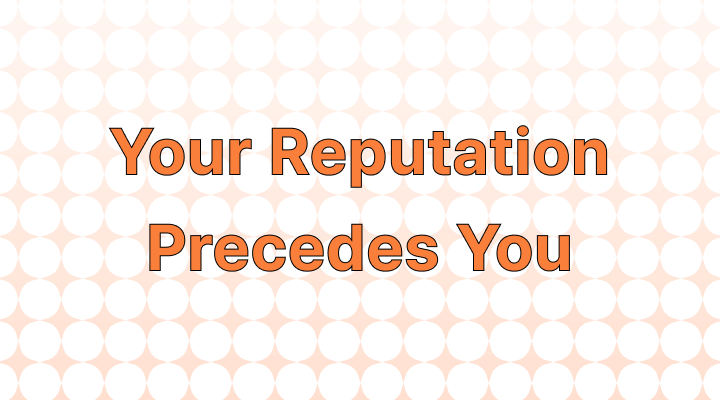- "Your reputation precedes you" encapsulates the idea that people form opinions about you based on what they've heard or read before meeting you.
Imagine a professional networking event where individuals from various industries gather to make connections and explore potential collaborations. In attendance is Sarah, a seasoned marketing executive known for her innovative campaigns and strategic thinking.
As Sarah enters the room, several attendees turn their heads and approach her with enthusiasm. They express their admiration for her work and mention how they've heard about her successful marketing initiatives in the past. In this situation, "Your reputation precedes you" comes to life as people's pre-existing knowledge of Sarah's achievements and skills influences their immediate perception of her.

Reputation holds paramount importance as it acts as a linchpin in trust-building, career advancement, and relationship cultivation. A positive reputation fosters credibility, opening doors to professional opportunities and establishing a foundation for lasting connections in both personal and business spheres. In the corporate realm, a favorable reputation is integral to customer loyalty, brand image, and market positioning. For example in this article, it states that "60% of consumers say that negative reviews made them not want to use a business."
With this mind, it is important to find out how to accurately use the idiom "your reputation precedes you."
From a grammar standpoint...
"Your reputation precedes you" is a sentence in the present simple tense. Let's break it down:
- "Your": This is a possessive pronoun, indicating that the reputation being referred to belongs to the person being addressed.
- "reputation": This is a noun referring to the opinions or beliefs that others have about someone based on their behavior, actions, or achievements.
- "precedes": This is the verb in the sentence, and it means to come before in time or order. In this context, it's suggesting that something (in this case, your reputation) arrives or is known before you physically arrive in a particular situation.
- "you": This is the pronoun referring to the person being addressed, whose reputation is being discussed.
So, putting it all together, the sentence is saying that the opinions or beliefs that others hold about you (your reputation) have already been formed or are known before you arrive at a particular place or situation.
How to use of "your reputation precedes you"
While the phrase "your reputation precedes you" is commonly employed in formal conversations, it also carries a lighthearted connotation. When used in addressing others, it signifies that individuals in close proximity to the person in question have already shared insights into their demeanor and character. Consequently, you possess a preconceived notion of what to anticipate when engaging in communication, collaboration, or social activities with them.
If someone utters the phrase "your reputation precedes you," it holds the potential for both a positive and negative undertone. In a favorable context, individuals anticipate positive attributes and accomplishments from you. This positive usage can be applicable in professional settings or social gatherings.
Conversely, the negative aspect of this expression involves its use as a cautionary signal. When employed with a negative connotation, individuals articulating the phrase are signaling awareness of your past missteps or transgressions. It serves as a subtle warning, indicating that they are vigilant for any potential lapses in behavior or expecting you to avoid repeating any negative actions. This negative use is often employed as a way to put someone on notice, particularly in professional or personal contexts where past behavior may impact future interactions.
Example scenarios
Below you will find different scenarios in which the phrase "your reputation precedes you" is found.
Professional Introductions:
- Scenario: A new employee is introduced to a team.
- Use: "Team, I'd like you to meet Sarah, our new marketing specialist. Sarah, your reputation precedes you; we've heard great things about your innovative campaigns."
Networking Events:
- Scenario: A professional is attending a networking event.
- Use: "John, this is Alex. He's the CEO of XYZ Company. Alex, John's reputation precedes him; he's known for his expertise in project management."
Job Interviews:
- Scenario: An applicant is interviewing for a position.
- Use: "Jennifer, this is Michael, the candidate for the senior analyst role. Michael, your reputation precedes you; your analytical skills and attention to detail have impressed our team."
More examples from the web
The three statements below are examples of the idiom "your reputation precedes you" on the web.
"It's become a cliché of the digital age: Thanks to Google, your reputation precedes you." - The New York Times
"If you're late or rude, your reputation may precede you and nobody will want to work with you." - WikiHow
"... I wasn't alone.Ramsay's reputation precedes his arrival. In America it has been fashioned by "Hell's Kitchen": a dozen semi-competent cooks in a "reality" ..." - The New York Times
Why would people misuse the phrase "your reputation precedes you"?
The phrase "Your reputation precedes you" may convey unintended negativity if used with an ambiguous or skeptical tone, particularly in inappropriate or casual contexts. A lack of specificity, overemphasis on negatives, or reliance on stereotypes might contribute to misunderstandings. Additionally, exaggeration or insincere use, particularly in gossip, can harm relationships and create an unfavorable atmosphere.
To ensure positive reception, it is crucial to employ the phrase sincerely, be mindful of context and tone, and provide specific details about the positive aspects of the person's reputation, steering clear of exaggeration and insincerity. Remember, "Your reputation precedes you" holds potential power in communication, and its impact depends heavily on how it is wielded.
Phrases similar to "your reputation precedes you"
- You have quite a reputation.
- Your name is well-known.
- People speak highly of you.
- You are famous for...
- I've heard a lot about you.
- You come highly recommended.
- Your track record is impressive.
- Your standing precedes you.
- You've made a name for yourself.
- Your character precedes you.
Phrases opposite to your reputation precedes you
- You're a blank slate.
- I haven't heard much about you.
- Your reputation doesn't precede you.
- You're an unknown entity.
- I'm not familiar with your background.
- You're a mystery to me.
- I don't have any preconceived notions about you.
- Your track record is a clean slate.
- You're starting with a clean slate.
- I don't have any pre-existing opinions about you.
Want to sound like a native speaker?
Engram’s AI-powered grammar checker makes your English sound like a native speaker’s, suggesting natural English expressions on top of fixing grammar, spelling, punctuation, word order, and vocabulary.

References:














